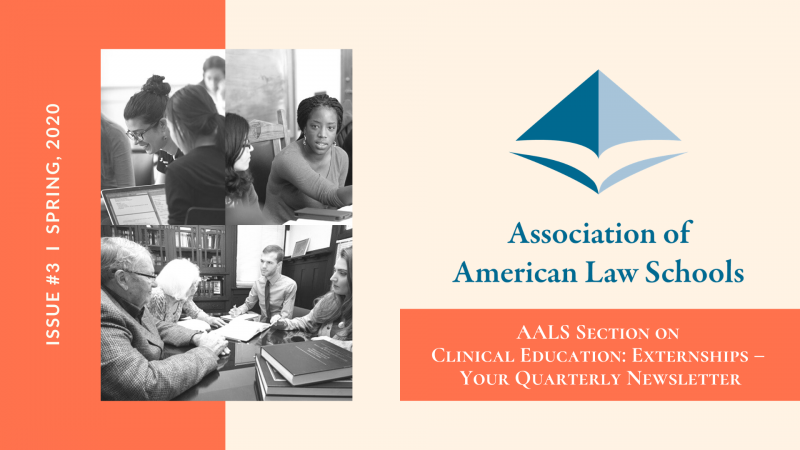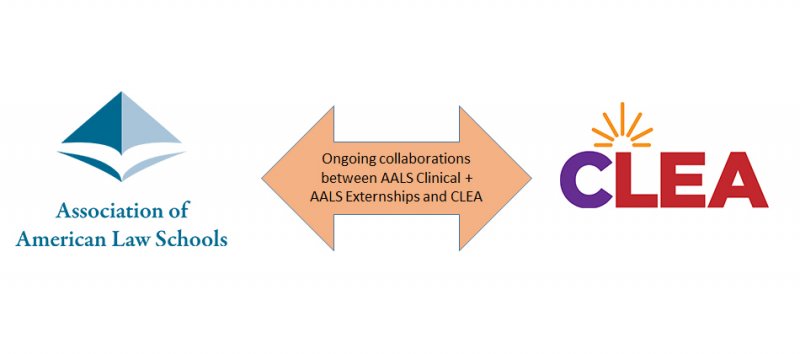AALS Externship Spring 2020 Newsletter

Message from Co-Chairs
Anahid Gharakanian and Meg Reuter
We’ll miss seeing everyone from our wonderful national externship community at X10. Hope to see you in October (X10 has been rescheduled to October 22-25, in Syracuse). In the meantime, let’s stay connected through Lextern and our listserv; the AALS Externship Subcommittees – two of them highlighted below; and this newsletter. Send along your reflection or informational submission by April 10th for our April newsletter.
Spotlight: AALS International and Semester Away Subcommittee
Preparing Faculty and Students for Practice in Today’s World
The AALS International and Semester Away Externship Subcommittee has held monthly video conference calls throughout the school year since 2014. A collaboration of law school externship faculty who either have or are considering international and U.S. semester away fieldwork programs, our group includes faculty with programs as small as one student and as large as twenty. We welcome anyone interested in any externship topic and know that we have all benefitted from viewing familiar issues through the international and remote lens. We also focus on domestic semester away topics such as “Semester in D.C.” and the “New York Pro Bono Scholars Program.”
One of the group’s goals is to remove barriers to semester away and international programs so that all schools can offer them to interested students. Because students earn credit and can receive financial aid, such programs can provide individually tailored transformational experiences preparing students for global practice. They are also less resource-intensive than larger study abroad programs. Law students in other countries and other graduate students in the U.S. regularly engage in international experiences before graduation, yet American law schools offer fewer opportunities. Students seek out such placements in comparing law schools. Research also shows that the cognitive benefits, especially in the areas of creativity, cultural humility and innovative problem solving, are significant.
Another of the group’s goals is to increase interactions between US and international faculty who teach experiential education. This past year we have had presenters from the UK, building collaboration with the European Network of Clinical Education (ENCLE), and from Australia, drawing on connections to the Global Alliance for Justice Education (GAJE). These video conference meetings span time zones and provide stimulating collaborations around topics such as reflection, assessment, and global mobility.
The committee has gathered and posted many valuable resources. Monthly calls are recorded and available at https://www.lexternweb.org/remote-and-international-placements. The committee is developing an international placement spreadsheet with contact information to help students from any school apply for international and long-distance placements. To get students prepared we have a shortlist of tips for advising students. A list of subjects covered in prior calls is available at international and semester away call topic list. The website includes a folder for each call with either a recording or notes of the call, along with reading materials, powerpoints, and handouts. The calls are listed in chronological order and materials are also organized in topic folders such as cultural competence, international syllabi, semester away syllabi, looking for placements, reflection topics, tech tools, timesheets, and written agreements.
Our subcommittee chairs, Gillian Dutton, Amy Sankaran, Sue Schechter, and June Tai are involved in workshops at Externships 10 on Remote Externships and International Externships. They are eager to continue this conversation and share resources and ideas at the Externships Conference, AALS Clinical Conference, and elsewhere.
We welcome your participation and your questions as we build and strengthen our International and Semester Away fieldwork programs.
Co-Chairs:

Gillian Dutton
Seattle University
duttong@seattleu.edu

Sue Schechter
University of California Berkeley
sschechter@law.berkeley.edu

Amy Sankaran
University of Michigan
aharwell@umich.edu

June Tai
University of Iowa
june-tai@uiowa.edu
Spotlight: Teaching Methodologies Subcommittee
Every one of us wants to teach skills that will make our students successful in their careers, and more broadly, their lives. It can be difficult, however, to find the time to hone our own skills. We created the Teaching Methodologies Subcommittee to find that space, and encourage our community to keep striving to find the best way to teach our students. Our goal is to identify effective teaching techniques related to specific skills identified by the legal community as necessary to the practice of law.
While there are a number of different tools that seek to predict or measure lawyer success, the Committee decided to use Marjorie M. Shultz and Sheldon Zedeck’s 26 “Lawyering Effectiveness Factors” to narrow our scope. Originally developed in the hope that the factors could become an alternative to the LSAT, the Effectiveness Factors are now seen as a guide for teaching our students to enter the profession as prepared as possible. We know we’re not alone in seeing experiential education curricula as the ideal pathway to teaching many of these essential skills.
Drawing from the 26 Effectiveness Factors, the Teaching Methodologies Subcommittee set out to discover the top three factors most salient for externship students (and teachers). We sent out a study to the Externships Listserv and analyzed the results. The top three categories were:
- “Self-Development: Attends to and initiates self-development,”
- “Practical Judgment: Determines effective and realistic approaches to problems” and
- “Able to See the World Through the Eyes of Others: Understands positions, views, objectives, and goals of others.”
Our subcommittee’s next step is to create three group-learning sessions to discuss how to teach these skills. Teachers who feel that their teaching is particularly effective in one of these areas can make a short presentation about how they teach, ideally sending out materials and class plans to colleagues so they can review (and/or do their homework!) beforehand. Our idea is then to have an online forum where participants can ask questions and discuss methodologies. Do you have a great class on reflection? Lead one of our forums! Have you been struggling with how to teach empathy? Come listen and learn.
We look forward to meeting and talking with you at Externships 10 in Syracuse, where we will be available with a mini-poster presentation during breakfast on Saturday – please come by, introduce yourself, and share ideas.
Co-Chairs:
CLEA and AALS - Ever wonder exactly what CLEA does versus AALS Externships Committee? Here’s a quick overview:
AALS
AALS Section on Clinical Legal Education promotes the communication of ideas, interests, and activities among members of the Section and makes recommendations on matters concerning clinical legal education.
The AALS Clinical Section developed the Clinicians' Desk Reference Handbook for new clinicians and runs the Clinician's Helping Hand Project. AALS also jointly sponsors the Clinical Law Review, with York University School of Law.
The AALS Externship Committee is a committee under the AALS Clinical Section. The Externship Committee operates through five subcommittees (see our fall 2019 newsletter for an overview).
A major focus of the Externship Committee’s work this year is to expand the number of people who are active in our national externship community.
Please contact the 2019-21 Co-Chairs to get involved:
Anahid Gharakhanian
agharakhanian@slaw.edu
(213) 738-6786
Margaret Reuter
reuterm@umkc.edu
(816) 235-6103
CLEA
The Clinical Legal Education Association exists to advocate for clinical legal education as fundamental to the education of lawyers. CLEA’s Externship Committee was created in 2011 to advise CLEA on issues relating to externships and to advocate on behalf of externship teachers.
The Committee has played a significant role in supporting CLEA's advocacy on field placement issues before the ABA.
Contact CLEA Externship Committee with questions or concerns about externship teaching generally, especially with respect to the ABA regulation of externships.
2020 Co-Chairs are:
Jodi Balsam, Brooklyn Law School
jodi.balsam@brooklaw.edu
(718) 780-0379
Carrie Wilkes Kaas, Quinnipiac
Carolyn.Kaas@QUINNIPIAC.EDU
(203) 582-3234


